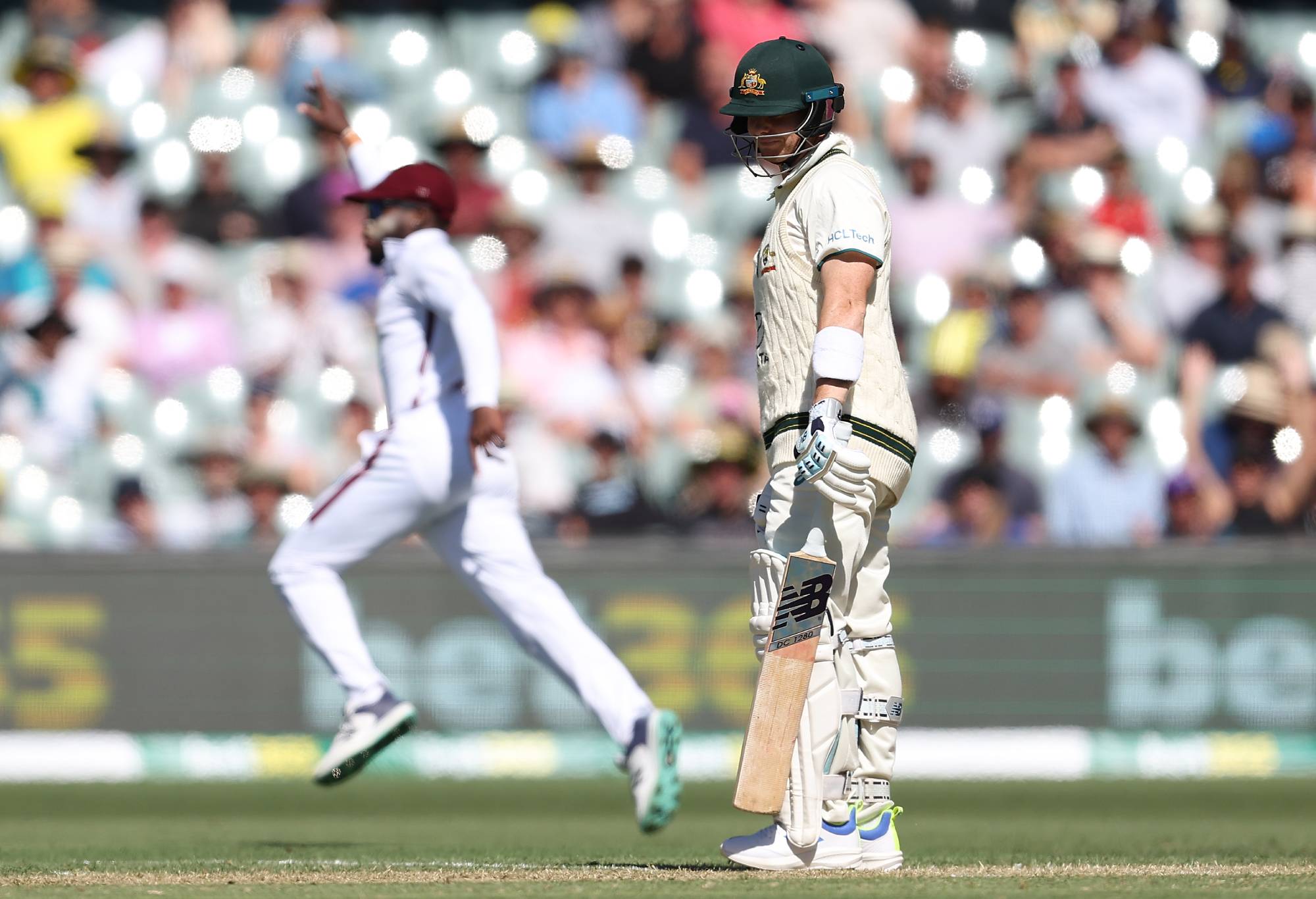Legacy on the line: Smith competing with all-time greats, and Voges, as he takes opening gamble in final phase of career

The Steve Smith to opener experiment could determine whether he finishes his Test career as the world’s statistically best batter since Donald Bradman or yet another batting behemoth who tails off in their twilight years.
For the first time since Australia’s disastrous home series loss to South Africa in 2016, Smith has tumbled out of the top 10 list for greatest batting averages in history.
After making 14 and 11 not out in his opening foray at the top of the order at Adelaide last week, his average is now 57.8, placing him 11th all time, a fraction ahead of legendary West Indies all-rounder Sir Garfield Sobers.
Above him and everyone else is Bradman’s iconic 99.94, followed by a group of greats, plus England’s rising star Harry Brook and the anomaly of the bunch, Adam Voges, the Western Australian who enjoyed a fruitful, yet brief, Test career in his late 30s nearly a decade ago before a serious concussion led to him retiring.
Using 20 innings as the minimum requirement, Brook has surged into second spot at 62.15 ahead of Voges (61.87) with the likes of South Africa’s Graeme Pollock, Windies pioneers George Headley and Everton Weekes, and England quartet Herb Sutcliffe, Eddie Paynter, Sir Walter Hammond and Ken Barrington the only other names ahead of Smith.
PlayerTests/InningsRunsHigh ScoreAverageDG Bradman (Aus)52/80699633499.94HC Brook (Eng)12/20118118662.15AC Voges (Aus)20/312667269*61.87RG Pollock (SA)23/41225627460.97GA Headley (WI)22/402190270*60.83H Sutcliffe (Eng)54/84455519460.73E Paynter (Eng)20/31154024359.23KF Barrington (Eng)82/131680625658.67ED Weekes (WI)48/81445520758.67WR Hammond (Eng)85/1407249336*58.45SPD Smith (Aus)106/189953723957.8GS Sobers93/1608032365*57.78
There was not a lot to be gleaned from Smith’s maiden Test as an opener – he looked assured at the crease as he got off to promising starts in each innings.
He was brought undone by a superb first-up delivery from Windies debutant Shamar Joseph on day one on an atypical Adelaide pitch that was too grassy for a Test although it was the kind of delivery outside the line of off stump that dyed-in-the-wool openers would look to leave while the ball is still new.
The Gabba pitch for Thursday’s second match won’t be the green monster which caused last year’s Test against South Africa to be done and dusted within two days.
But any time the pink ball is in operation is a tricky one for top-order batters so even though the Aussies should overpower their eighth-ranked opponents, Smith is not guaranteed a run feast.
Travis Head looks set to play despite contracting COVID-19 after his hometown Test.
If he were to miss the match it would leave the selectors in a quandary given Matt Renshaw is the back-up batter in the squad.
Steve Smith looks on after being dismissed by Shamar Joseph. (Photo by Paul Kane/Getty Images)
Would they throw him into the middle order again at Head’s No.5 spot after that tactic failed in India last year, meaning three of Australia’s specialist batters would be coming in at unfamiliar positions with a newbie opener in Smith and Cameron Green at four?
Or would they rush Renshaw in at opener in his preferred role, switching Smith back to four and dropping Green down a notch?
Despite a few cryptic comments last year surrounding his future, Smith’s not quite ready to be put out to pasture yet at 34 even though he has been hampered by a string of minor injuries.
Many of Australia’s best batters have tailed off in the final few years of their career, particularly when they had reached their mid 30s.
Ricky Ponting, the player who rivals Smith for his dominance with the bat this century, went from a peak of 59.99 in his prime at 2006 to 51.85 when he retired six years later a few weeks shy of his 38th birthday.
After turning 35, he scored just three centuries in 29 Tests at 37.19 as he eked out the final few series of his career after ceding the captaincy to Michael Clarke.
Smith’s recently retired teammate David Warner is the latest example of a decline leading up to his Test retirement with 1475 runs from 26 Tests at 32.77 in the couple of years he played after turning 35.
The production of Adam Gilchrist (37.16 in 11 Tests), Justin Langer (39.58 in 11) and Matthew Hayden (40.59 in 19) also dropped significantly as they entered the second half of their 30s.
Join the stars from rugby league, AFL, Test cricket, BBL and more at An Evening with Tom Brady.
Perhaps it’s the mental fatigue not the physical deterioration that causes some players to fade away when the greys appear or hair starts to thin (before magically reappearing in Ponting’s case).
A common theme among these players is that they played continuously at the top level for many years without respite.
Warner’s fellow 37-year-old Usman Khawaja has bucked the trend recently after spending a few seasons out of the Test side while Voges didn’t even receive his baggy green until he was 35 when he became the oldest player in history to score a ton on debut.
Bradman after 35? Well, he had a gap of more than eight years in the middle of his career due to World War II, padding up at 38 for the home Ashes of 1946-47 until his famous farewell tour to England two years later.
In those 15 Tests he churned out another eight centuries as he piled on 1903 runs at 105.72.
If not for his career coinciding with wartime, Bradman could have set aggregate records which would still stand today.
Bradman’s tally of 6996 runs from 52 Tests is now the 57th highest total of all time as the generations that followed played more and more matches.
His average will almost certainly never be bettered and whether Smith ends up second to The Don will depend on whether he can adapt to the opening role he’s volunteered to take on.
